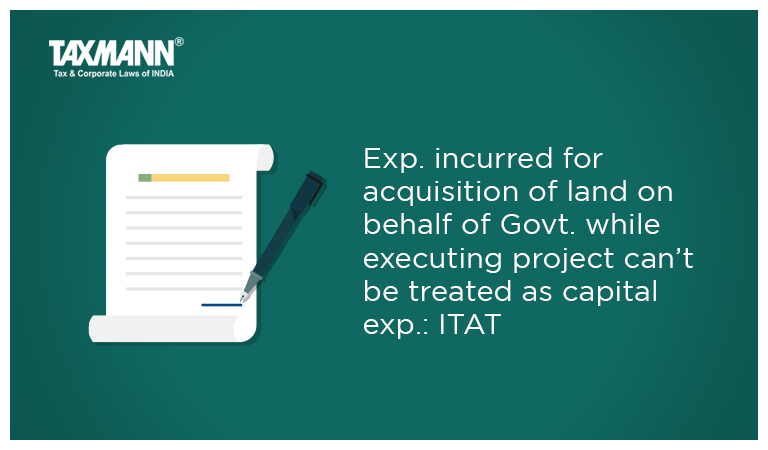Exp. incurred for acquisition of land on behalf of Govt. while executing project can’t be treated as capital exp.: ITAT
- Blog|News|Income Tax|
- 2 Min Read
- By Taxmann
- |
- Last Updated on 18 July, 2022

Case Details: DCIT v. National Projects Construction Corporation Ltd. - [2022] 140 taxmann.com 51 (Delhi-Trib.)
Judiciary and Counsel Details
-
- A.D Jain, Vice President & Dr B.R.R Kumar, Accountant Member
- Ms Shweta Yadav, Sr. DR for the Appellant.
- Somil Agarwal, Adv. for the Respondent.
Facts of the Case
Assessee-Co. was a public sector undertaking under the Ministry of Water Resources. Its main business was civil construction of dams, bridges, tunnels, powerhouses, flyovers, buildings, canals, and other infrastructure projects.
During the financial year 2013-14, it executed Border Out Post (BOP) works for the Ministry of Home Affairs (MHA) and made payment of Rs. 5.26 crores to various States towards the cost of land acquisition and electrification charges and claimed deduction of same as revenue expenditure.
The Assessing Officer (AO) held that payment made for land acquisition and electrification was of capital nature and not allowable as revenue expenditure. On appeal, the Commissioner (Appeals) treated expenditure as revenue expenditure and allowed same. Aggrieved revenue filed the instant appeal before the Tribunal
ITAT Held
The Delhi Tribunal held that assessee had paid on behalf of MHA (GoI) and corresponding income against these expenses has been booked as turnover in the profit and loss account. Amount paid for land acquisition compensation and other incidental charges had been booked as revenue expenditure under the head ‘Incidental Charges on Works’.
It could be noted that no property was held by the assessee. The expenditure incurred towards land acquisition compensation for BOPs works on behalf of MHA and the asset was created in favour of BSP and held by BSF (BSF (an organization under the control of the Ministry of Home Affairs) not the assessee. There was no capital asset in the name of the assessee.
Thus, it was clear that expenditure incurred by assessee during the financial year 2013-14 towards land acquisition compensation was the part and parcel of the contract agreement and the same was included in the total project cost. Hence these expenditures on behalf of MHA as project costs couldn’t be treated as capital expenditure as no assets were created in name of the assessee.
Disclaimer: The content/information published on the website is only for general information of the user and shall not be construed as legal advice. While the Taxmann has exercised reasonable efforts to ensure the veracity of information/content published, Taxmann shall be under no liability in any manner whatsoever for incorrect information, if any.

Taxmann Publications has a dedicated in-house Research & Editorial Team. This team consists of a team of Chartered Accountants, Company Secretaries, and Lawyers. This team works under the guidance and supervision of editor-in-chief Mr Rakesh Bhargava.
The Research and Editorial Team is responsible for developing reliable and accurate content for the readers. The team follows the six-sigma approach to achieve the benchmark of zero error in its publications and research platforms. The team ensures that the following publication guidelines are thoroughly followed while developing the content:
- The statutory material is obtained only from the authorized and reliable sources
- All the latest developments in the judicial and legislative fields are covered
- Prepare the analytical write-ups on current, controversial, and important issues to help the readers to understand the concept and its implications
- Every content published by Taxmann is complete, accurate and lucid
- All evidence-based statements are supported with proper reference to Section, Circular No., Notification No. or citations
- The golden rules of grammar, style and consistency are thoroughly followed
- Font and size that’s easy to read and remain consistent across all imprint and digital publications are applied



 CA | CS | CMA
CA | CS | CMA
